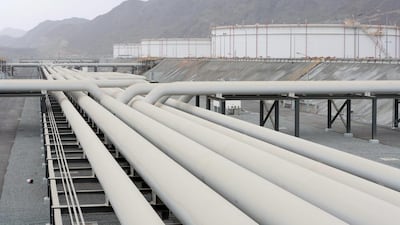Technological advances in the oil and gas world have always been important but they have taken on an added significance since the oil price crash last year.
Companies are under pressure from host governments and shareholders to make deep cost savings while also maintaining or improving performance.
The competition to win the innovation awards at this year's Adipec oil gathering, which opens tomorrow in Abu Dhabi under a banner of Innovation and Sustainability, has therefore been intense and garnered considerable industry attention as oil companies look to leverage their technological prowess to win big deals in an increasingly competitive environment.
"Innovation is a bloodline of our oil and gas industry," said Rafi Baghdjian, chief operating officer at Shell Abu Dhabi. "It helps us cut costs, allowing us to become more competitive in this economic environment."
There were a record number of entries from private and state-owned companies for the categories, where companies make a case both for their technological innovation and what that means in terms of money saved or major project goals achieved.
Nationally important projects - not least those in Abu Dhabi - have set extremely demanding operational and strategic goals for oil and gas projects, requiring companies to emphasise their focus on technology development to gain a competitive edge.
"Traditionally, R&D spending in international and national oil companies has been very low [0.2 to 0.5 per cent of sales], as compared to oilfield services and other industries," says Louis Besland, the head of Middle East oil, gas and chemicals at Alix Partners, a consulting firm.
"In this environment, they need to regain technology control to differentiate themselves."
Winnowing the final 10 entries down to a shortlist of just three for this year's innovation categories was extremely difficult, said Mr Baghdjian, who was a judge for both the "surface" and "subsurface" categories of best oil and gas innovation or technology.
International Petroleum Investment Company's US$4.2 billion Adcop pipeline - shortlisted in the headline "mega projects" category - demonstrates innovation even at the highest strategic level.
The pipeline, which started operation three years ago, allows onshore Abu Dhabi crude to bypass the Straits of Hormuz and load in Fujairah for export to world markets, and "changes radically the way the UAE transports its crude oil production", according to Ipic.
"The pipeline, terminal and loading facilities also provide capacity to support the planned growth of the UAE's future oil production," said Energy Minister and Ipic managing director Suhail Al Mazrouei.
As well as enhanced security, Adcop means an average saving of two to three days in the cost of chartering and insuring tankers that previously had to sail from the Indian Ocean into the enclosed Arabian Gulf to reach Abu Dhabi before loading.
Private sector companies dominate the two innovation categories, particularly the oilfield services company Schlumberger.
The technology involved can sound a little dense, but the innovations' benefits to the projects usually are pretty clear.
In the subsurface category, Schlumberger's "ZEiTECS Shuttle" is a new way to maintain crucially important pumps that are used in about half the world's oilfields. Maintenance of these subsurface pumps often causes production delays and adds costs. But the new technology "avoids the need to deploy rigs and hoists that could otherwise be used for more profitable oil-generating activities and keeps drilling programmes on schedule", explained Neil Griffiths, a manager in Schlumberger technologies unit.
Schlumberger's other subsurface shortlisted entry is the system it developed with Saudi Aramco to manage the Manara oilfield reservoir.
The bottom line for the Manara innovation is that "workflows that normally take three to six months can be performed in one day", said Stephen Dyer, manager for "intelligent completions" at Schlumberger. Also, as the company told shareholders in July, it means a significantly higher percentage of oil can be recovered from the reservoir and is a "game changer" for the industry.
The final shortlisted subsurface innovation - BP's development of the giant Khazzan gasfield in Oman - also ultimately is about saving time and "hundreds of millions of dollars", said David Spain, senior adviser for unconventional upstream technology at BP.
Khazzan is a hydraulic fracturing or fracking operation that requires blasting along the drilling route to free up gas trapped in the rocks.
"The specific innovation is a toolkit of mathematical algorithms and workflows which we combine into a graphical display format," Mr Spain explained. "It is like reading and diagnosing an EKG," the heart monitor used in hospitals. It allows BP to pick the optimal parts to blast, "otherwise, we are just blasting blindly at the rock and the rock is very different along the wellbore".
As with many of the projects that made it to the shortlist, Khazzan is of crucial strategic importance to its owner, in this case Oman.
amcauley@thenational.ae
Follow The National's Business section on Twitter

Adipec 2015: Oil technology competition heats up
Companies are under pressure from host governments and shareholders to make deep cost savings while also maintaining or improving performance.
Most popular today
